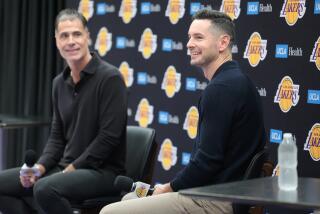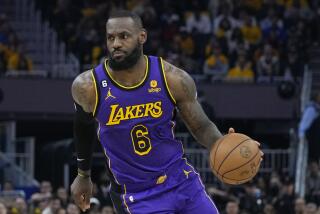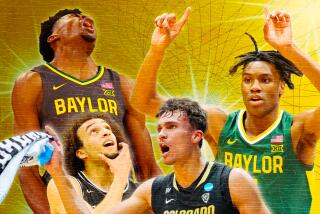Are the Lakers better than the Minnesota Timberwolves?
To make the playoffs, the Lakers need to be better than seven teams in the Western Conference.
In the first eight of 14 entries, the Lakers were ruled better than the New Orleans Pelicans, Phoenix Suns, Sacramento Kings and Utah Jazz but not as good as the Oklahoma City Thunder, San Antonio Spurs, Memphis Grizzlies and Clippers.
Are the Lakers better than the Minnesota Timberwolves?
Point guard
The Timberwolves have one of the most intriguing young point guards in the league in Ricky Rubio.
The third-year guard is a gifted playmaker, but he’s still learning the NBA game. Recovering from a knee injury, Rubio shot just 36% from the field last season in 57 appearances while averaging 10.7 points with 7.3 assists.
Steve Nash appears to be healthy after a difficult year in which he broke his leg in the second game of the season. Despite his age(39), Nash is still a tremendous initiator and shooter.
The Wolves have J.J. Barea and camp invitee A.J. Price behind Rubio. Barea has often been a difficult cover for the Lakers, although he’s more of a scorer than a true point. Alexey Shved can play at either guard spot.
Behind Nash, the Lakers have two solid veterans in Steve Blake and Jordan Farmar.
Rubio may eventually emerge as a true star, but the Lakers are steadier at point guard.
Shooting guard
The Wolves added veteran shooter Kevin Martin over the summer.
Last season, he averaged 14 points a game for the Oklahoma City Thunder, shooting 45% from the field and 42.6% from three-point range.
Though Martin isn’t much of a defender, he helps the Wolves where they were awful last year -- outside shooting.
If Kobe Bryant can return healthy from his Achilles surgery, even if that takes until November or even December, the Lakers will be formidable at off guard.
Minnesota picked up UCLA rookie Shabazz Muhammad in the draft (via trade with the Utah Jazz). The team also has Othyus Jeffers, Lorenzo Brown and Shved at the two.
Corey Brewer and Dante Cunningham might get time defensively at shooting guard as well.
Behind Bryant, the Lakers boast a long list of players who will fight for minutes, including Jodie Meeks, Nick Young, Wesley Johnson, Xavier Henry and Darius Johnson-Odom (the last two are camp invitees who still have to make the team) and even point guards Blake and Farmar.
A healthy Bryant alone gives the Lakers the advantage over Minnesota.
Small forward
The Wolves just lost Chase Budinger indefinitely to a knee injury. Last year, Budinger had a similar problem, which negatively affected the team’s outside shooting.
In his place, Minnesota may start Brewer, an improved shooter and capable defender. The Wolvers have experimented with Derrick Williams at the three, with mixed results.
The Timberwolves also have Robbie Hummel and Cunningham at the position.
Small forward is not a major strength for the Lakers. Coach Mike D’Antoni may start offensive-minded Young with Johnson backing him up as the stronger defender.
Shawne Williams, Marcus Landry and Elias Harris, each fighting to make the final roster, bring shooting and toughness to the position. Harris still needs to develop his outside shot but brings versatility to the floor. Bryant may also play some small forward.
Neither team is especially strong at the three, especially with Budinger sidelined once again.
Power forward
Kevin Love is coming off a down year with hand issues, playing just 18 games while shooting 35.2% from the field.
Now healthy, he should be able to return as one of the league’s best power forwards. In addition to being a dominant rebounder, Love at his best can shoot the ball with range and force his way to the free-throw line.
Minnesota also has Williams and Chris Johnson at the four.
Power forward is somewhat up for grabs with the Lakers. The Lakers could start Pau Gasol, Jordan Hill, Chris Kaman, Shawne Williams or even Wesley Johnson. It’s an area with which D’Antoni appears willing to experiment, at least initially.
If the Lakers go with Gasol, the two teams are on closer footing, but if Love has a resurgent season, Minnesota still has the advantage.
Center
Nikola Pekovic is one of the strongest big men in the league. He has a traditional low-post game, averaging 16.3 points with 8.8 rebounds a night last season.
Gasol has more skill than Pekovic, both offensively and defensively, but the Minnesota center plays with more physicality.
Minnesota also has former Laker Ronny Turiaf, who is a solid energy player but not much of an offensive threat. The Wolves also brought in Gorgui Dieng (also via trade with the Jazz) to develop.
Love can play center if needed in a smaller lineup.
Gasol is coming back from a difficult year with knee and foot problems. After a summer rehabbing his knees, he hopes to have a strong year as the Lakers’ primary inside option (following the departure of Dwight Howard).
The Lakers also have former all-star Chris Kaman, along with Robert Sacre and Hill. Pekovic is tough, but Gasol and Kaman have the edge.
Who is better?
The combination of Love and Pekovic may be slightly better than Gasol and Kaman, but not enough to offset a healthy Bryant -- but how healthy he is remains to be seen.
The Wolves are not an especially strong defensive team; neither are the Lakers.
Minnesota was one of the most injured teams in the league last season, winning just 31 games. The Wolves will be better than they were a year ago but 45 is about high as they’ll get.
The Lakers won 45 and should finish somewhere in the 40-50 range.
The margin isn’t dramatic but the Lakers should finish ahead of at least five teams -- including Minnesota.
ALSO:
Lakers still face the question of tempo this season
Doc Rivers calls the Lakers ‘the best franchise in sports history’
Kobe Bryant responds to Michael Jordan’s comments on Twitter
Email Eric Pincus at eric.pincus@gmail.com and follow him on Twitter @EricPincus.
More to Read
All things Lakers, all the time.
Get all the Lakers news you need in Dan Woike's weekly newsletter.
You may occasionally receive promotional content from the Los Angeles Times.






